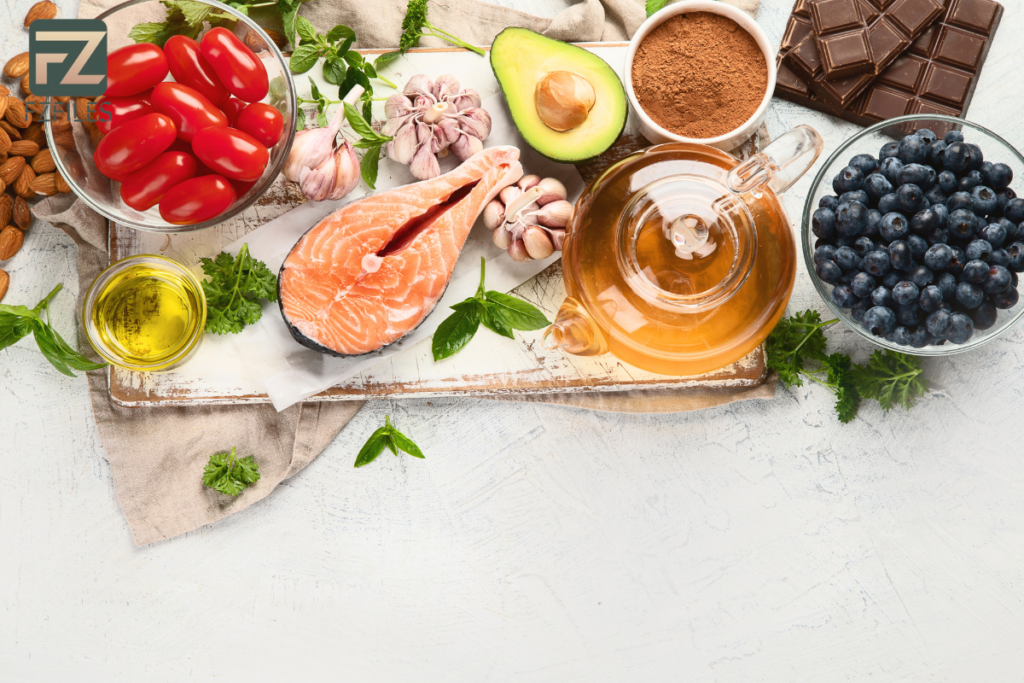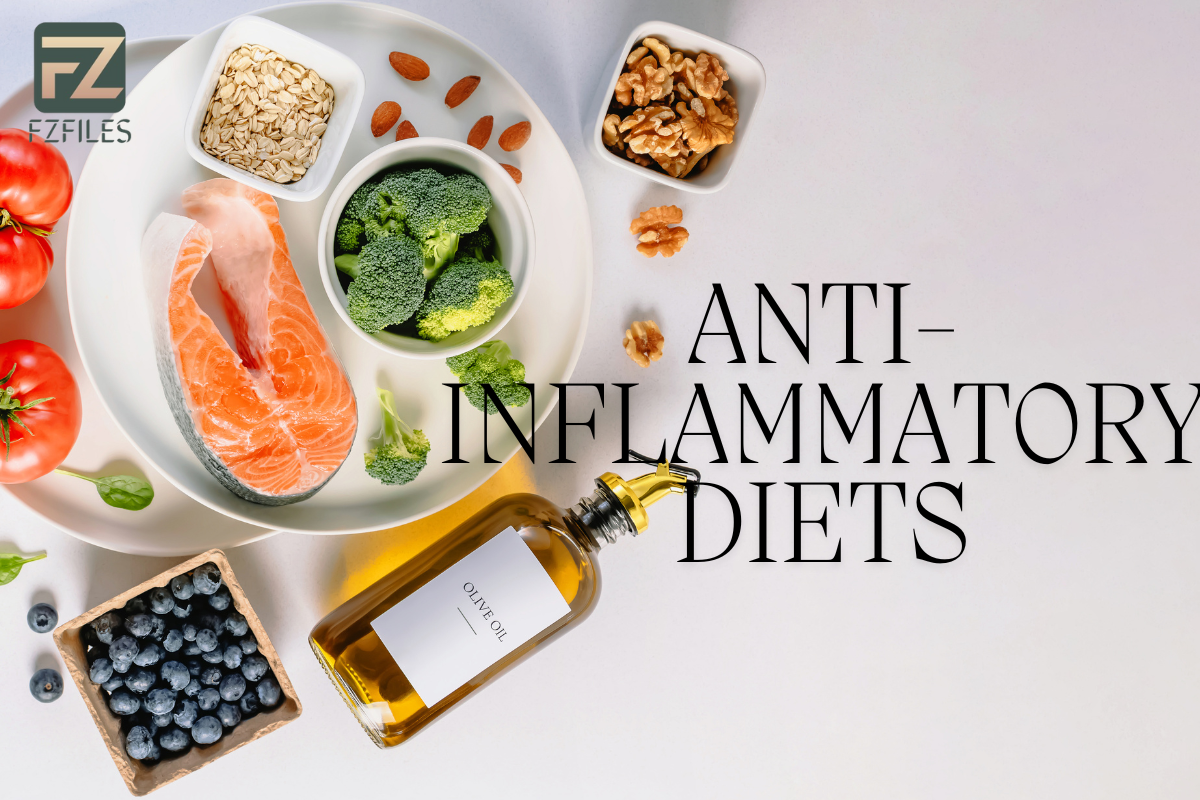Introduction to Anti-Inflammatory Diets
As the fitness community continues to evolve, so does the understanding of how diet impacts performance, recovery, and overall health. Anti-inflammatory diets have gained significant attention for their potential to reduce muscle soreness, enhance recovery, and improve overall health. In 2024, new dietary guidelines and recipes have been introduced, emphasizing the role of anti-inflammatory foods in maintaining optimal fitness levels. This comprehensive guide will explore the benefits, top foods, meal plans, and expert tips for incorporating an anti-inflammatory diet into your fitness regimen.
Benefits of Anti-Inflammatory Diets for Fitness
Reduced Muscle Soreness
Intense workouts often lead to muscle soreness, which can hinder your ability to train consistently. Anti-inflammatory diets help mitigate this soreness by reducing inflammation in the body. Foods rich in antioxidants, such as berries and leafy greens, can help neutralize free radicals produced during exercise, thereby reducing muscle damage and soreness.
Enhanced Recovery
Recovery is crucial for athletes and fitness enthusiasts alike. An anti-inflammatory diet supports faster recovery by promoting better nutrient absorption and reducing oxidative stress. Omega-3 fatty acids found in fatty fish, flaxseeds, and walnuts play a significant role in reducing inflammation and promoting muscle repair.
Improved Joint Health
Joint pain and stiffness can be a barrier to maintaining an active lifestyle. Anti-inflammatory diets are rich in nutrients that support joint health, such as omega-3 fatty acids, antioxidants, and vitamins. Regular consumption of these nutrients can help reduce joint inflammation, improve mobility, and decrease pain.
Overall Health Benefits
Beyond fitness, anti-inflammatory diets offer a range of health benefits, including a reduced risk of chronic diseases like heart disease, diabetes, and certain cancers. By incorporating anti-inflammatory foods into your diet, you can improve your overall health and longevity.
Top Anti-Inflammatory Foods
Fatty Fish
Greasy fish like salmon, mackerel, and sardines are wealthy in omega-3 unsaturated fats, which have strong mitigating properties. Consuming these fish consistently can assist with decreasing irritation and further develop heart wellbeing.

Berries
Berries, including strawberries, blueberries, and raspberries, are loaded with cell reinforcements, nutrients, and fiber. Their high cell reinforcement content aides battle oxidative pressure and aggravation.
Leafy Greens
Mixed greens like spinach, kale, and Swiss chard are plentiful in nutrients, minerals, and cell reinforcements. They are low in calories and high in nutrients, making them an excellent choice for reducing inflammation.
Nuts and Seeds
Nuts and seeds, including almonds, walnuts, flaxseeds, and chia seeds, provide healthy fats, fiber, and antioxidants. They are a convenient and nutritious snack that supports anti-inflammatory efforts.
Olive Oil
Additional virgin olive oil is a staple of the Mediterranean eating routine and is known for its mitigating properties. It contains oleocanthal, a compound that has comparative impacts to non-steroidal calming drugs (NSAIDs).
Turmeric
Turmeric contains curcumin, a powerful anti-inflammatory compound. Adding turmeric to your meals or taking it as a supplement can help reduce inflammation and support overall health.
Green Tea
Green tea is wealthy in cancer prevention agents, especially catechins, which make calming impacts. Drinking green tea regularly can help reduce inflammation and promote weight loss.
Tomatoes
Tomatoes are an excellent source of lycopene, an antioxidant that has anti-inflammatory properties. Cooking tomatoes can increase the availability of lycopene, making them even more beneficial.
Creating an Anti-Inflammatory Meal Plan
Breakfast
Smoothie Bowl with Berries and Seeds
- Mix spinach, frozen berries, banana, and almond milk.
- Top with chia seeds, flaxseeds, and a handful of nuts.
Oatmeal with Turmeric and Berries
- Cook oats with almond milk and a pinch of turmeric.
- Top with new berries and a shower of honey.
Lunch
Grilled Salmon Salad
- Grill a salmon fillet and serve on a bed of mixed greens.
- Add cherry tomatoes, cucumber, and a drizzle of olive oil and lemon juice.
Quinoa and Vegetable Bowl
- Cook quinoa and mix with roasted vegetables (bell peppers, zucchini, and broccoli).
- Top with avocado slices and a sprinkle of nuts.
Dinner
Turmeric Chicken with Roasted Vegetables
- Marinate chicken breasts in turmeric, garlic, and olive oil.
- Roast with a mix of vegetables such as sweet potatoes, carrots, and Brussels sprouts.
Lentil and Spinach Stew
- Cook lentils with onions, garlic, spinach, and tomatoes.
- Season with cumin, turmeric, and a touch of olive oil.
Snacks
Green Tea and Almonds
- Enjoy a cup of green tea with a handful of almonds.
Greek Yogurt with Berries
- Top Greek yogurt with fresh berries and a sprinkle of flaxseeds.
Sample Recipes
Anti-Inflammatory Smoothie
Ingredients:
- 1 cup spinach
- 1/2 cup frozen blueberries
- 1/2 cup frozen strawberries
- 1 banana
- 1 cup almond milk
- 1 tablespoon chia seeds
- 1 tablespoon flaxseeds
Instructions:
- Blend spinach, blueberries, strawberries, banana, and almond milk until smooth.
- Pour into a bowl and top with chia seeds and flaxseeds.
Turmeric Chicken and Roasted Vegetables
Ingredients:
- 2 chicken breasts
- 1 tablespoon turmeric
- 2 cloves garlic, minced
- 2 tablespoons olive oil
- 1 sweet potato, chopped
- 2 carrots, chopped
- 1 cup Brussels sprouts, halved
Instructions:
- Preheat the oven to 400°F (200°C).
- Marinate the chicken breasts in turmeric, garlic, and olive oil.
- Place the marinated chicken and vegetables on a baking sheet.
- Roast for 25-30 minutes, until the chicken is cooked through and the vegetables are tender.
Expert Tips for Reducing Inflammation
Stay Hydrated
Drinking plenty of water is crucial for reducing inflammation and maintaining overall health. Aim for at least 8 glasses of water a day, and consider herbal teas like green tea for added benefits.
Get Regular Exercise
Exercise is a powerful anti-inflammatory tool. Regular physical activity can help reduce inflammation, improve cardiovascular health, and enhance overall well-being. Aim for at least 150 minutes of moderate-intensity exercise per week.
Manage Stress
Chronic stress can contribute to inflammation. Practice stress-reducing techniques such as mindfulness, meditation, deep breathing exercises, and yoga to keep stress levels in check.
Avoid Processed Foods
Processed foods often contain unhealthy fats, sugars, and additives that can increase inflammation. Focus on whole, nutrient-dense foods to support your anti-inflammatory efforts.
Prioritize Sleep
Quality rest is fundamental for decreasing aggravation and supporting generally speaking wellbeing. Go for the gold long stretches of rest each evening and lay out a steady rest schedule.
Limit Alcohol and Tobacco
Both alcohol and tobacco can increase inflammation in the body. Limit alcohol consumption to moderate levels and avoid tobacco products altogether.
Conclusion
Incorporating an anti-inflammatory diet into your fitness regimen can significantly enhance your performance, recovery, and overall health. By focusing on nutrient-dense foods, staying hydrated, exercising regularly, managing stress, avoiding processed foods, prioritizing sleep, and limiting alcohol and tobacco, you can effectively reduce inflammation and support your fitness goals. The new dietary guidelines and recipes introduced in 2024 offer a comprehensive approach to achieving optimal health through anti-inflammatory nutrition.

[…] comprehensive guide explores the best post-workout nutrition practices for 2024, incorporating the latest research and expert […]